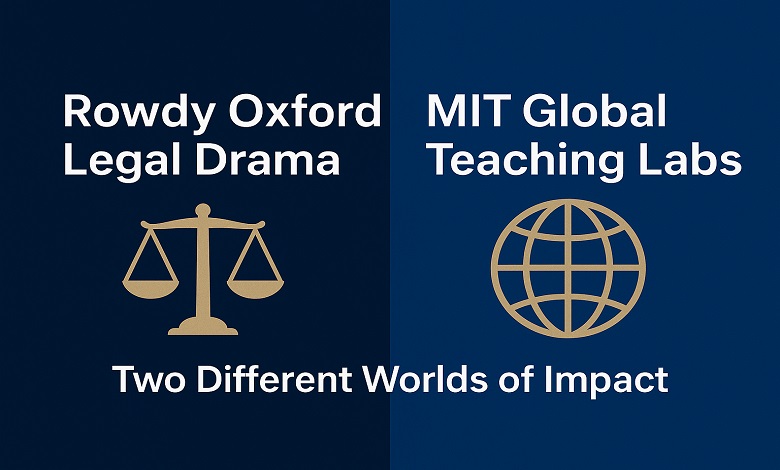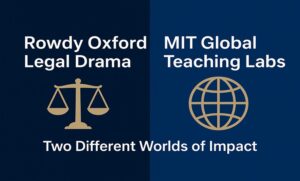In today’s fast-changing global environment, education, law, and culture are deeply connected. On one hand, we have stories like the Rowdy Oxford legal drama, where courtroom debates and university-related controversies capture headlines. On the other hand, initiatives such as the MIT Global Teaching Labs are shaping the future of global education by empowering students, educators, and communities worldwide. While one represents conflict and dissolution in a legal system, the other collaboration, innovation and learning represents. However, both emphasize the importance of human institutions in the design of society.
This article takes a closer look at these two vastly different subjects—what they mean, why they matter, and how they connect to the broader themes of justice, knowledge, and social progress.
The Rowdy Oxford Legal Drama: A Symbol of Tradition and Turmoil
Oxford University has long been a symbol of academic skill, tradition and prestige. However, like any institution over the centuries of history, there is also a background of disputes, disputes and legal challenges. Rowdy Oxford Legal Drama refers to issues and conflicts that attract wide attention – from disputes between students and faculties to large matters related to governance, prestige or university policy.
This makes these legal plays particularly attractive, there is a conflict between tradition and modern values. Oxford is a place where history, rituals and centuries old customs meet the requirements of the contemporary society. When legal disputes arise, they do not only include individuals – they affect the institution’s great identity.
For example, the student is opposed to academic freedom, allegations of abuse or disagreement about money and governance often cause trial. The media increases these conflicts, noticing them as “disorderly disturbance” when demonstrating intensive debate, noise disagreement and emotional notions. Rowdy Oxford Legal Drama is therefore more than just a trial – it is a cultural event that questions justice, justice and elite institutions’ role in today’s world.
Why People Follow Oxford’s Legal Battles
- The reputation of the institution: When a university’s iconic that Oxford faces dispute, the world is aware of.
- Cultural symbolism: Legal acting in Oxford reflects great questions in society, such as equality, openness and responsibility.
- media coverage: Media thrives with stories that connect history, drama and high -profile individuals.
- Educational values: Students of law, history and sociology analyze cases how institutions develop under legal investigation.
In this sense, the Rowdy Oxford legal drama is both entertainment and education. It shows us how even the most respected institutions are not above conflict and how law plays a critical role in resolving disputes fairly.
MIT Global Teaching Labs: Inspiring the Next Generation
While Oxford is related to the challenges of tradition and modernity, another institution, Massachusetts Institute of Technology (MIT), works to shape the future of education worldwide. One of the most impressive MIT initiatives is Mit Global Teaching Labs (GTL).
The program was launched as part of MIT’s international search, and sends MIT students worldwide to collaborate with schools, teachers and communities. The goal is simple, but powerful: to create science, technology, engineering science and mathematics (voice) available, attractive and inspiring to young students.
How the MIT Global Teaching Labs Work
- International Reach: MIT students travel to partner countries where they work directly with high schools and local educators.
- Hands-On Learning: Instead of relying only on textbooks, the labs focus on experiments, projects, and interactive teaching methods.
- Knowledge Exchange: It’s not just about MIT students teaching abroad—it’s also about learning from local cultures, traditions, and educational systems.
- Empowering Communities: By building long-term relationships, MIT fosters sustainable growth in science and technology education worldwide.
The MIT Global Teaching Labs emphasize practical learning. For example, instead of only explaining the laws of physics, students might design experiments to demonstrate them in action. Instead of abstract math problems, learners might work on real-life applications that connect with their own communities.
The Impact of MIT Global Teaching Labs
- Students gain global experiences: MIT -educated cultural understanding, teaching experience and leadership skills.
- Benefits Distributions: Schools in Partnerland have access to state teaching methods and voting inspiration.
- Reduce cultural intervals: The program creates a two -way stream of knowledge where both sides benefit from.
- Long -lasting innovation: By encouraging curiosity and important thinking, GTL creates a basis for future researchers, engineers and problem solutions.
In short, my global teaching laboratories, geography, access and violations of opportunities, while promoting a love for learning and innovation.
Contrasting the Two Worlds: Conflict vs. Collaboration
At first glance, Rowdy Oxford belongs to Legal Drama and Mit Global Teaching Labs completely different universe. One is about controversy, traditions and legal struggles, while the other is about teaching, science and collaboration. Nevertheless, both are deeply associated with the institution’s role in the formulation of human society.
• Rowdy Oxford Legal Drama emphasizes how institutions handle disputes, justice and responsibility.
• MIT global teaching laboratories emphasize how the institutions promote collaboration, knowledge sharing and innovation.
Both stories remind us that universities and educational institutions are not just academic places – they are ecosystems where laws, culture and education are cross.
We can learn lessons
From Rowdy Oxford Legal Drama
- Justice must remain transparent and fair, even in the most prestigious institutions.
- Tradition should not block progress; universities must adapt to modern ethical and legal standards.
- Controversies, while disruptive, can lead to reforms and improvements in governance.
From MIT Global Teaching Labs
- Education is most powerful when it is interactive, accessible, and global.
- Collaboration across cultures enriches both teachers and students.
- Building curiosity and critical thinking is more impactful than rote memorization.
Together, these lessons show us that institutions—whether through courtroom debates or classroom projects—are essential for progress.
The Bigger Picture: Education and Justice in the 21st Century
In today’s mutual connected world, we need both justice and innovation to move forward. Rowdy Oxford Legal Drama can highlight the errors of elite institutions, but also strengthens the importance of law and justice. Mit Global Teaching Labs can separate the world, but they represent the hope of building a better future through education.
Both stories remind us that institutions are human deeds. They are of our values, our battles and the form of our ambitions. The struggle for a court of Oxford and a science laboratory at a MIT party school shows our ongoing discovery for justice, knowledge and progress.
Conclusion
Rowdy Oxford Legal Drama and Mit Global Teaching Labs JuicePogan shows two sides of the same coin. One is about dealing with disputes in a world of tradition and reputation, while the other is about sharing knowledge and construction futures through innovation and collaboration.
What they unite them is their influence on society. Legal plays in Oxford also show us the importance of justice and responsibility in the most respected institutions. MIT’s teaching initiative shows us the transformative power of education on borders.
When we navigate the challenges of the 21st century, we both need attitudes: the law to ensure habilitation and knowledge to ensure development. Together, they form the basis of a world where institutions not only solve conflicts, but also promote progress.







